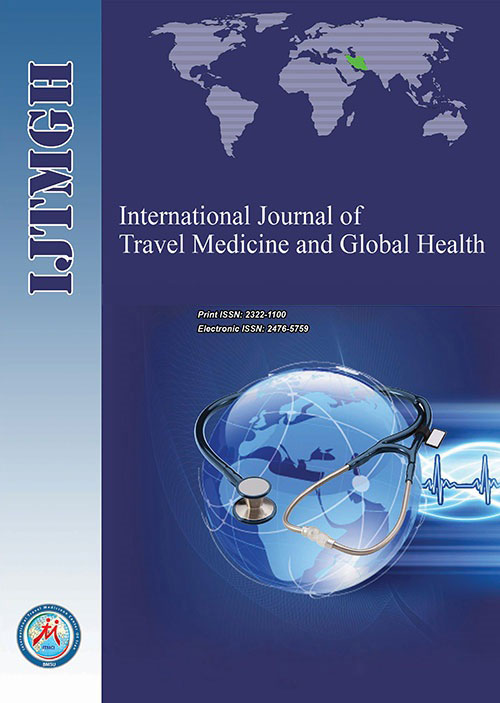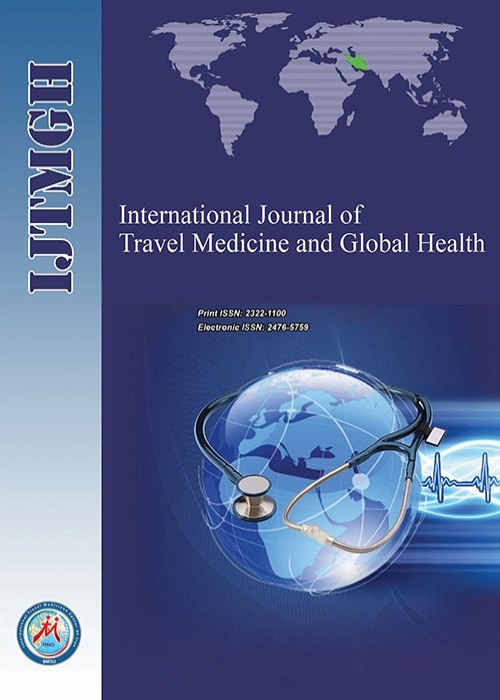فهرست مطالب

International Journal of Travel Medicine and Global Health
Volume:6 Issue: 3, Summer 2018
- تاریخ انتشار: 1397/06/12
- تعداد عناوین: 7
-
-
Pages 88-91
Irresponsible travel has the potential to harm both the traveler and the host destination. The subject of responsible travel is a major focus of the International Society of Travel Medicine, whose Responsible Travel special interest group has been very active in providing leadership for travel medicine practitioners in relation to the protection of local travel destination communities. Healthcare professionals have a responsibility to safeguard the dual interests of travelers and their hosts. This can be achieved by drawing the traveler’s attention to examples of irresponsible tourism during the pre-travel consultation. This perspective article aims to explore various aspects of irresponsible travel, including environmental damage travelers may cause; medical tourism and its impact on both the home and destination health service; voluntourism involving poorly prepared volunteers interacting with vulnerable communities in the host country; and sex tourism, including prostitution and child trafficking. Further research is needed to better understand the attitudes of travelers, travel health professionals, and the travel industry towards responsible tourism and to overcome barriers to its implementation.
Keywords: Responsible Travel, Ethical, Medical tourism, Sex Tourism, Volunteering -
Pages 92-99
Cholera is an acute diarrheal infection caused by the ingestion of food or water contaminated with the bacterium Vibrio cholerae. The causative agent of this disease was originally described by Filippo Pacini in 1854, and afterwards further analyzed by Robert Koch in 1884. It is estimated that each year there are 1.3 million to 4 million cases of cholera, and 21 000 to 143 000 deaths worldwide from the disease. Cholera remains a global threat to public health and an indicator of inequity and lack of social development. A global strategy on cholera control with a target to reduce cholera deaths by 90% was launched in 2017. Before 1817, cholera was confined to India’s Bay of Bengal. However, primarily following trade and migration between India and Europe, by the 1830s, cholera had spread internationally. The global spread of cholera was the driving force behind the first International Sanitary Conference in Paris, in 1851. The global health significance of cholera is underscored by its inclusion as one of four priority diseases in the 1969 and 2005 International Health Regulations. This article reviews the evolution of seven cholera pandemics and their reciprocal impacts on migration and global health. Also discussed are global efforts to address cholera, particularly the International Health Regulations, the 1969 and 2005 version of which stipulated that cholera epidemics require mandatory reporting to the IHR. This article concludes with a brief case study of Yemen’s unprecedented cholera epidemic.
Keywords: Cholera, Quarantine, Global Health, Pandemics, International Health Regulations -
Pages 100-109IntroductionThe upward trend of seeking bariatric surgery tourism will only grow with the globalization of medical care. We aim to describe the experiences participants of a supervised weight loss program in relation to their pursuit of bariatric tourism.MethodsSemi-structured interviews with an unbiased questionnaire were conducted to obtain a profound understanding of the current Irish bariatric surgery recruitment program and bariatric patients’ perception of it.ResultsAnalysis of interview data yielded 5 themes. Each theme was elaborated further with selected quotes from the coding process. Participants were asked to suggest potential solutions to current bariatric surgery and tourism support concerns in Ireland. Authors’ recommendations based on a literature review and the analysis of the interview transcripts are also provided.ConclusionAny patients with morbid obesity and many years of attempted weight loss should receive a bariatric procedure to alleviate not only weight-related metabolic co-morbidities, but also the associated psychiatric burden. The currently available eligibility criteria and the lack of resources render an ideal surgical intervention inaccessible to many. Efforts must be made to scrutinize the efficacy of the existing criteria and the availability of resources. Alternatively, a bariatric tourism scheme that allows uninterrupted patient care should be developed.Keywords: Medical tourism, Bariatric surgery, Obesity, Weight management
-
Pages 110-120IntroductionThe geographical movement of people from one area to another poses the threat of transmission of infectious diseases. Kenya is among the vulnerable countries when it comes to disease transmission, because it is a major transport hub in East Africa, yet data on the availability and uptake of pre-travel health services is limited.MethodsA cross-sectional descriptive study was conducted to determine the uptake of pre-travel health services. The systematic sampling method was used to obtain a sample size of 384 travelers among those in the waiting lounge prior to departure; four key informants were chosen purposively. A self-administered questionnaire was used for data collection. The results of data analysis are presented in the form of tables, graphs, charts, and text.ResultsThe majority of respondents (70.6%) knew of at least one health service offered to international travelers in Kenya. The most sought-after pre-travel health service was vaccination (70.97%), but very few (13.93%) travelers sought pre-travel health advice on how to stay healthy while abroad. The majority of travelers were positive about pre-travel health services. The Port Health Department focuses more on the health of international arrivals as opposed to departures; there are no functional travel health clinics.ConclusionThe results indicated that the government pays little attention to departing international travelers. Therefore, it is important for the government to develop policies, guidelines, and structures that will ensure that pre-travel health services are received by travelers prior to departure. Travel clinics need to be set up to increase the uptake of pre-travel health services. Moreover, further research should be conducted.Keywords: Airports, Travel, Health Services, Immunization, Vaccines, Kenya
-
Pages 121-124IntroductionInvolving approximately 4% of malignancies in women, ovarian cancer remains one of the most fatal cancers. However, it is important to consider conditions which are not primary ovarian diseases, but mimic their behaviors. In the present study, the epidemiological characteristics of extra-ovarian conditions mimicking ovarian masses are evaluated.MethodsThis cross-sectional study was conducted on patients with a primary diagnosis of ovarian mass who underwent surgery by gynecologists between January 2012 and March 2016. The surgeon’s primary diagnosis and the final histopathology assessment report were evaluated for each patient. In cases where the final histopathology report was not in the spectrum of gynecologic pathology, possible reasons for incompatibility were investigated.ResultsUltimately, 1876 patients with a mean age of 48.26±15.4 years underwent analysis. Among these patients, 27 (1.4%) had masses of a non-gynecologic origin. The final diagnoses were divided into four main categories: masses with a gastrointestinal origin (55.5%), infectious (18.5%), those with a retroperitoneal origin (18.5%), and embryologic-origin masses (7.4%).ConclusionThe results suggest that extra-ovarian diseases should be considered in differential diagnoses of patients with a primary diagnosis of ovarian cancer. Furthermore, it was found that metastases from gastrointestinal tract tumors and infectious diseases are the most common pathologies among extra-ovarian conditions.Keywords: Iran, Prevalence, Ovarian Cancer, Gynecology
-
Pages 125-136Introduction
More than one third of travelers to developing countries report health problems when traveling. The Egyptian Ministry of Health reports the occurrence of 400 cases of malarial infection yearly among Egyptian travelers. This article aimed to assess the knowledge, attitude, and practice (KAP) of Egyptian travelers towards infectious diseases, vaccination, and malaria chemoprophylaxis.
MethodsA survey was conducted at Cairo International Airport and included 1500 travelers. The questionnaire inquired about the travelers’ knowledge about infectious diseases at their destinations and their KAP regarding vaccination, malaria, and its prophylaxis.
ResultsMost travelers (68%) had poor knowledge, specifically; 90.2%, 85.6%, 88.5% did not know the endemic diseases at their destinations, the modes of disease transmission, or the protective measures against disease, respectively. Knowledge about malaria prevalence, symptoms, modes of transmission, and prevention was good in only 18%, 29.8%, 6.7%, and 21.4% of travelers, respectively. Poor practice of malaria prophylactic measures was found in 66.3% of travelers. Although 91.3% did not receive any vaccination, the general attitude towards vaccination was good. The total travel health knowledge, practice, general attitude toward vaccination, and the perceived benefits of malarial prophylaxis scores were significantly correlated with older age and high socioeconomic level. Most of the studied travelers (90.4%) did not carry or use malaria chemoprophylaxis. Ignorance was the main barrier to receiving vaccines (65.3%) and to adherence to malaria chemoprophylaxis (88.3%).
ConclusionEgyptian travelers have poor travel health knowledge and practices. Their knowledge and practice scores improve with older age, urban residence, and higher educational levels. They have a good attitude towards vaccination, and ignorance was the main barrier to sound practices.
Keywords: Egypt, Survey, Travel Health, Malaria, Vaccine-Preventable Diseases


